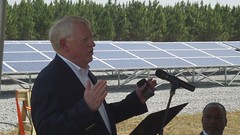 Can the Valdosta-Lowndes County Industrial Authority (VLCIA)
commit we the local taxpayers to a $150 million bond issue
for a private company like the
Macon-Bibb County Industrial Authority just did?
Maybe.
Can the Valdosta-Lowndes County Industrial Authority (VLCIA)
commit we the local taxpayers to a $150 million bond issue
for a private company like the
Macon-Bibb County Industrial Authority just did?
Maybe.
VLCIA has already issued $15 million in bonds for which apparently the Lowndes County Commission has committed the county, that is, we the taxpayers, to pay the debt service. That comes out of VLCIA’s one mil of dedicated tax income. But according to the intergovernmental contract, it’s actually not even just from VLCIA’s current millage:
The current VLCIA millage is one mil, or about $3 million a year, collected by the county in property taxes and handed over to VLCIA.
Section 4.4 Security for Contract Payments and for Bonds.
(a) The obligation of the County to make the payments required pursuant to Section 4.1(a) hereof shall be a general obligation of the County for which its full faith and credit is pledged, and shall be payable from any lafully available funds, subject to the Tax Funding Limit. In particular, the County agrees to levy an annual tax on all taxable property located within its boundaries, as now existent and as the same may be extended, at such rate or rates, as limited by the Tax Funding Limit, as and when it may be necessary to provide the County with sufficient revenues to make all payments required to be made by the County under this Contract.
But VLCIA’s charter says (in Section 5): Continue reading


.jpg)






